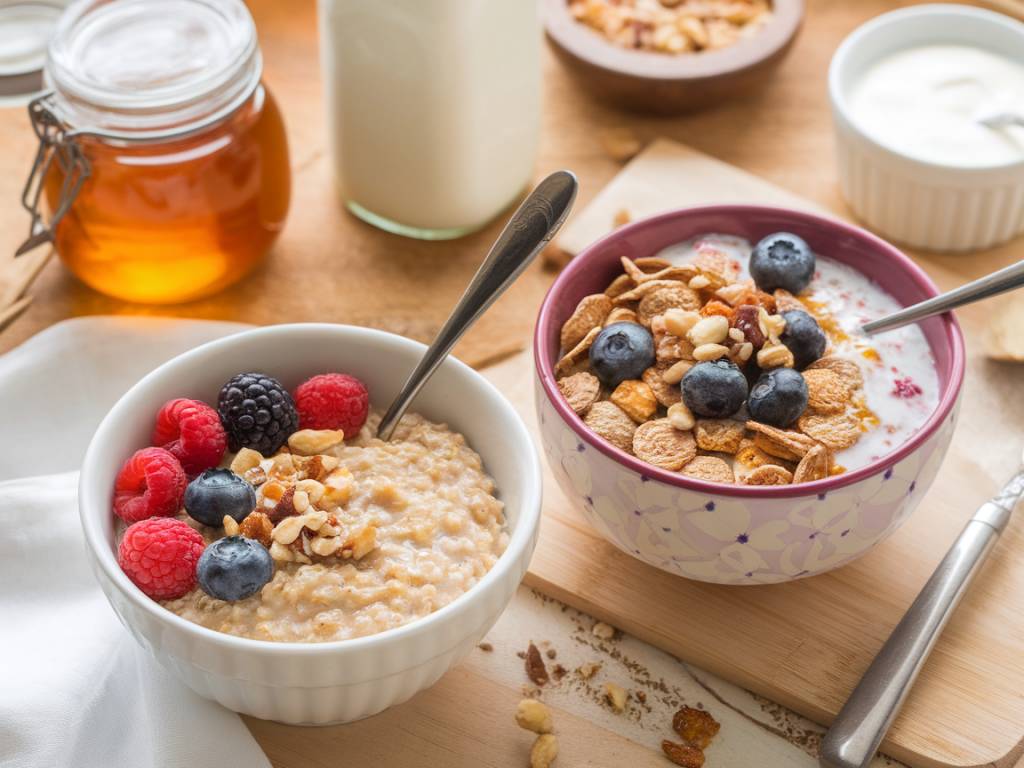
Why Digestion Matters for Your Well-being
Digestive health is often overlooked, but it’s the cornerstone of your overall well-being. Think about it—your body relies on digestion to absorb nutrients, fuel energy, and maintain immunity. Yet, many of us deal with bloating, discomfort, or low energy without realizing our diet could be the culprit.
The good news? You don’t need a complete kitchen overhaul to see improvements. By making a few simple diet swaps, you can give your gut the boost it needs to function efficiently.
Swap Refined Grains for Whole Grains
Let’s start with one of the easiest changes: ditch refined grains like white bread, pasta, and rice for their whole-grain counterparts. Whole grains such as brown rice, quinoa, and whole-grain bread are rich in fiber, which promotes regular bowel movements and helps prevent constipation.
Here’s a practical tip: If you’re used to white rice, try mixing it with brown rice in the beginning. Over time, your taste buds will adjust, and you’ll appreciate the nuttier flavor of whole grains.
Trade Sugary Snacks for Fruits
That mid-afternoon energy crash? It’s often the result of sugary snacks wreaking havoc on your blood sugar levels. Instead, reach for fiber-rich fruits like apples, pears, or berries. Not only do they satisfy your sweet tooth, but they also support digestion with natural fibers and antioxidants.
A handy idea: Keep a bowl of fresh fruit on your kitchen counter. When hunger strikes, it’s easier to grab an apple if it’s in plain sight.
Replace Dairy with Nut-Based Alternatives
Dairy can be a digestion nightmare for some, especially for those with lactose intolerance or sensitivity. If you experience bloating or discomfort after consuming milk or cheese, it might be worth experimenting with non-dairy alternatives like almond milk, oat milk, or cashew-based cheeses.
Before you panic, know that the plant-based options today are better than ever—creamy, flavorful, and perfect for everything from coffee to smoothies.
Choose Lean Proteins Over Fatty Cuts
Fatty cuts of meat can be harder to digest and may leave you feeling sluggish. Instead, opt for lean proteins such as chicken breast, turkey, or fish. Plant-based proteins like lentils, chickpeas, and tofu are also excellent options and come with the added benefit of fiber.
If grilling or roasting chicken feels repetitive, try creating bowls with quinoa, roasted vegetables, and shredded chicken, drizzled with a tahini dressing. It’s simple yet satisfying.
Say Goodbye to Artificial Sweeteners
Sure, artificial sweeteners like aspartame and sucralose promise zero calories, but they can wreak havoc on your gut. These sugar substitutes often lead to bloating and disrupt the balance of healthy gut bacteria.
Instead, explore natural sweeteners like honey or maple syrup in moderation, or simply train your palate to enjoy the natural sweetness of foods.
Drink Herbal Teas Instead of Soda
Sugary sodas and carbonated drinks can cause gas and bloating, leaving you uncomfortable. Herbal teas, on the other hand, can soothe your stomach and support digestion. Try peppermint tea for bloating or ginger tea to combat nausea.
Tip: Brew a big pot of herbal tea in the morning, let it cool, and sip it throughout the day as a refreshing alternative to cold drinks.
Incorporate Fermented Foods
Fermented foods are a treasure trove of probiotics—live bacteria that support a healthy gut. Adding small portions of foods like yogurt (opt for plain, unsweetened versions), sauerkraut, kimchi, or kefir to your diet can improve digestion and enhance nutrient absorption.
If you’re new to fermented foods, start with just a few tablespoons to allow your body to adapt to the added probiotics.
Opt for Smaller, More Frequent Meals
Ever feel completely stuffed after a big meal? Your digestive system does too. Eating smaller, more frequent meals can ease the burden on your stomach and prevent bloating.
A practical idea is to use smaller plates to control portion sizes naturally. This trick works wonders for slowing down your eating pace as well.
Hydrate, Hydrate, Hydrate
It’s worth repeating: water is your best friend when it comes to digestion. Staying hydrated helps break down food, absorb nutrients, and keep things moving smoothly in your gut.
To make hydration a habit, carry a reusable water bottle with you at all times. Add slices of lemon or cucumber for a refreshing twist.
Listen to Your Body
Healthy digestion isn’t about following a one-size-fits-all solution; it’s about figuring out what works for you. Pay attention to how certain foods make you feel and adjust accordingly. If something leaves you bloated or sluggish, consider swapping it out for a more gut-friendly option.
Always take note of the small habits that make a big difference over time. A little awareness goes a long way in helping your body thrive.
Start With One Swap at a Time
The idea of transforming your diet overnight can feel overwhelming, but the beauty of these swaps is that you don’t have to do everything at once. Start small. Maybe this week, you switch to whole grains. Next week, you explore dairy alternatives.
Each tiny step you take adds up to a healthier, happier digestive system. Before you know it, these swaps will become second nature, and your body will thank you for it.


